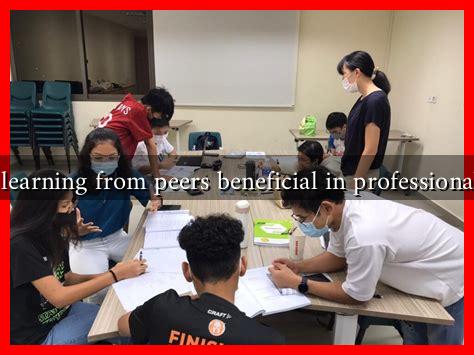-
Table of Contents
Why is Learning from Peers Beneficial in Professional Circles
In today’s fast-paced and ever-evolving professional landscape, the importance of continuous learning cannot be overstated. One of the most effective ways to enhance skills and knowledge is through peer learning. This article explores the myriad benefits of learning from peers in professional circles, supported by research, examples, and statistics.
The Concept of Peer Learning
Peer learning refers to the process where individuals learn from one another, sharing knowledge, skills, and experiences. This collaborative approach can take various forms, including mentorship, group discussions, workshops, and informal interactions. The essence of peer learning lies in its ability to foster a supportive environment where individuals can grow together.
Benefits of Peer Learning
Learning from peers offers several advantages that can significantly enhance professional development. Here are some key benefits:
- Enhanced Understanding: Engaging with peers allows individuals to gain different perspectives on complex topics. For instance, a software developer might learn new coding techniques from a colleague who specializes in a different programming language.
- Increased Motivation: Working alongside peers can boost motivation and accountability. When individuals see their colleagues striving for excellence, they are often inspired to elevate their own performance.
- Real-World Application: Peer learning often involves practical, real-world scenarios that can be more relevant than theoretical knowledge. For example, a marketing team might collaborate to analyze a recent campaign’s success, learning from each other’s insights.
- Networking Opportunities: Building relationships with peers can lead to valuable networking opportunities. These connections can open doors to new job prospects, collaborations, and mentorships.
- Development of Soft Skills: Peer learning encourages the development of essential soft skills such as communication, teamwork, and problem-solving. These skills are crucial for career advancement in any field.
Case Studies and Examples
Numerous organizations have recognized the value of peer learning and have implemented programs to facilitate it. For instance, Google has long promoted a culture of collaboration, where employees are encouraged to share knowledge through various platforms, including internal forums and workshops. This approach has led to increased innovation and employee satisfaction.
Another example is the healthcare sector, where peer learning is vital for improving patient care. Hospitals often conduct case reviews where medical professionals discuss patient outcomes and treatment strategies. This collaborative learning environment not only enhances individual skills but also leads to better patient care overall.
Statistics Supporting Peer Learning
Research supports the effectiveness of peer learning in professional settings. According to a study published in the Journal of Business Research, organizations that foster peer learning see a 20% increase in employee engagement and a 15% boost in productivity. Furthermore, a survey by LinkedIn found that 94% of employees would stay at a company longer if it invested in their learning and development.
Implementing Peer Learning in Your Organization
To harness the benefits of peer learning, organizations can take several steps:
- Create Structured Programs: Develop formal peer mentoring or coaching programs that pair experienced employees with newcomers.
- Encourage Knowledge Sharing: Implement platforms for employees to share insights, such as internal blogs or discussion forums.
- Facilitate Team Projects: Promote collaborative projects that require team members to learn from one another.
- Provide Training Resources: Offer resources and training sessions that encourage peer-to-peer learning.
Conclusion
Learning from peers is a powerful tool in professional development that fosters collaboration, enhances understanding, and builds essential skills. By creating an environment that encourages peer learning, organizations can not only improve employee engagement and productivity but also cultivate a culture of continuous improvement. As the workplace continues to evolve, embracing peer learning will be crucial for both individual and organizational success.

